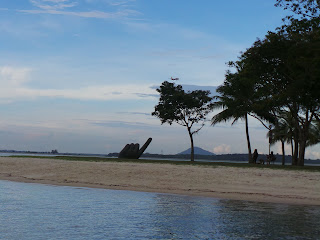Learned a lot on Singapore Energy from the LJ today.
Singapore was first lighted up in 1906 from the first power station, the Maxkenzie Road Power Station. It used coal then - a fossil fuel which emitted 40% more CO2 than the natural gas which we are using now.
There was a severe blackout on 29 June 2004 due to the disruption of gas supply from Indonesia. This prompted the government to ramp up Singapore's energy security.
We have been teaching the students about the fuel switch under the 2012 Singapore Green Plan - that natural gas emits 30% less CO2 compared to burning oil for energy. What I had learned for this LJ which I must say is a great add on is the opening of Singapore's first LNG terminal in 2013. With liquefied natural gas there is decrease reliance on piped natural gas. Today 95% of our energy is from natural gas - a mixture of piped and liquefied natural gas.
When looking at energy options, the 3 factors are:
1. Price competitiveness
2. Sustainability
3. Reliability (24/7) and security.
Also learned something interesting - that there is a storage of chilled water below the Marina bay sand area which provides energy to the district.
Micro-grid test bed at Pulau Ubin:

Arriving at the jetty by bum boat from Changi Point Ferry Terminal - $3 per pax and they will wait for 12 pax before they set off.
So awed by the rocks near the jetty
A map of the island near the jetty
The main purpose of our visit to look at the micro grid test bed on how solar energy is tapped on the island. This is the learning journey which is part of Geography Symposium 2018
Rows of bicycle rental shops
There is also a taxi service near the jetty.
The island has attracted quite a number of tourists
A few restaurants on the island
By using the new energy instead of generator, the owner Ms Koh electricity bill is reduced from $800 plus to $300 plus a month
The familiar stage which I saw decades ago
The noisy generator which is still being used by the residents - though it is labelled ultra-silent. There are around 100 plus residents on the island who have benefitted greatly from the micro-grid bed test. They have installed SMART meter.
the solar panels on the roof top slightly tilts downwards towards the east. This maximise the absorption of solar and also allow the water to drain off the roof
The geography teachers' learning journey to Pulau Ubin micro-grid test bed.
The geography teachers also enjoyed a game of "monopoly" with questions or tasks related to energy.
Can you see the solar panel behind the papaya trees?
Love the aerial roots of the mangrove
So picturesque
Passed by the Changi Spit
Many fish farms near the island
As it is so near to the airport, we saw quite a number of planes flew by
Beautiful houses protected by the sea wall
drainage into the sea
Look at the view - captivating right?
More photos here:
https://www.facebook.com/
Main source of energy on the island
Solar panel
Diesel
Energy storage banks
Phase 1
Test bed
Intermittency dip with high cloud clover, back up by batteries
Last resort Hybrid diesel and biomass
Cables underground all shops and houses w smart meter but some still on generator
Every household or shop has a smart meter.
Taping on solar reduces electricity demand
Day usage is higher (industrial)
Renewable and no need to burn fossil fuel
Batteries -3 types
- Lithium
- Zinc air sensitive to humidity
- Sodium ion
Hanging and floating solar panels
Now 95% is from natural gas.
Solar, biomass
More is on solar
Micro grid is pioneered by EMA
Questions were raised on alternative energy sources for Singapore.
Some reservoirs have floating solar panels. Biggest at Tengah reservoir
New HDB flats ready with solar panels
Innova clean energy
Tapping on solar
Island.. pulau semakau explore wind energy
West part of island tapping on turbine











































































